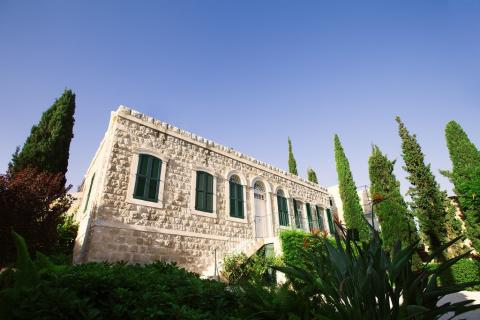On one occasion an unfriendly Governor, hating these peaceful, honest Bahá’ís, thought of a plan for destroying their means of livelihood. He gave orders to the police: "There are fifteen shops owned by Bahá’ís; go to-morrow morning early, lock them up and bring the keys to me." The Master called the Bahá’ís to Him that same evening and said: "Do not open your shops to-morrow, but wait and see what God will send to us." The next morning the Governor waited for the keys. Again he sent them. "Go," he said to the police, "and see if the shops are open." The police announced that the shops were closed. He waited and waited; at ten o'clock all the shops were still unopened, those shops which were always accustomed to open and be ready for trade at seven o'clock. The Governor was greatly perplexed. His plan did not seem to be working as he had schemed.
The Mufti (the chief mulla) came to the Governor whilst he waited. "How are you?" said the Governor. "Quite well," was the reply, "but very sad; because of a telegram from Damascus, I am full of sorrow." "Show it to me," said the Governor. To his consternation he saw that the telegram was from the Vali of Damascus, deposing him from his place as governor, and directing that he be conducted by the police to Damascus. In fear, sorrow, and amazement he went to his own house to make such preparation as was possible for the hurried and unlooked for journey. The shops of the friends were saved.
‘Abdu’l-Bahá, hearing of the misfortune which had befallen the Governor, went to visit him. "You must not be sad because of this; everything in this world changes. Can I do anything for you?" He asked of the erstwhile Governor. "Now that I am being taken away from them, there will be none to care for those I love. My dear family will be sad, lonely, and helpless, with nobody to counsel and aid them in their sore need." "Do not be filled with grief, but tell me where you wish your family to go." "If only they could go to Damascus?" "Now, trust in me, and let your heart be lightened of its distress; I will gladly send an honourable escort with your wife and children to Damascus; you will find that they will be there soon after your own arrival."
The Master sent the family with a trustworthy escort, providing mules and everything needed for the comfort of the journey - quite a formidable undertaking in those days. The command was worded: "Take these persons safely and with great respect to join the Governor at Damascus." A telegram was despatched after they had set out: "I have sent your family to Damascus. They will very soon arrive in safety."
When they arrived in Damascus the Governor, being greatly rejoiced, enquired of the escort as to the cost of the journey. "It is nothing; I am but obeying the command of the Master." The Governor then wished to give the escort a present for himself. "I desire no recompense: I am but obeying the Master's command, I can accept nothing." When invited to stay the night for rest and refreshment, the reply was: "I obey the Master's command to return without delay." "Then I pray you take a letter, which I will write at once to the Master."
"O `‘Abdu’l-Bahá," the letter read, "I pray you pardon me. I did not understand. I did not know you. I have wrought you great evil. You have rewarded me with great good." Thus was this enemy, who had indeed wrought great evil to the prisoners, repaid by being loaded with benefits.
Always did ‘Abdu’l-Bahá obey this Tablet of Bahá’u’lláh:
Be generous in prosperity, and thankful in adversity. Be worthy of the trust of thy neighbour, and look upon him with a bright and friendly face. Be a treasure to the poor, an admonisher to the rich, an answerer of the cry of the needy, a preserver of the sanctity of thy pledge. Be fair in thy judgment, and guarded in thy speech. Be unjust to no man, and show all meekness to all men. Be as a lamp unto them that walk in darkness, a joy to the sorrowful, a sea for the thirsty, a haven for the distressed, an upholder and defender of the victim of oppression. Let integrity and uprightness distinguish all thine acts. Be a home for the stranger, a balm to the suffering, a tower of strength for the fugitive. Be eyes to the blind, and a guiding light unto the feet of the erring. Be an ornament to the countenance of truth, a crown to the brow of fidelity, a pillar of the temple of righteousness, a breath of life to the body of mankind, an ensign of the hosts of justice, a luminary above the horizon of virtue, a dew to the soil of the human heart, an ark on the ocean of knowledge, a sun in the heaven of bounty, a gem on the diadem of wisdom, a shining light in the firmament of thy generation, a fruit upon the tree of humility.
